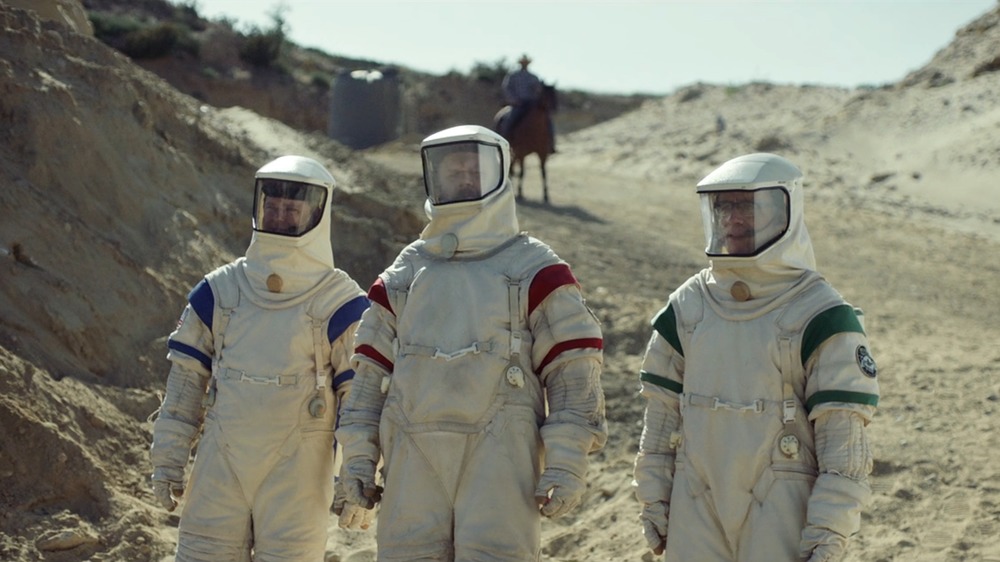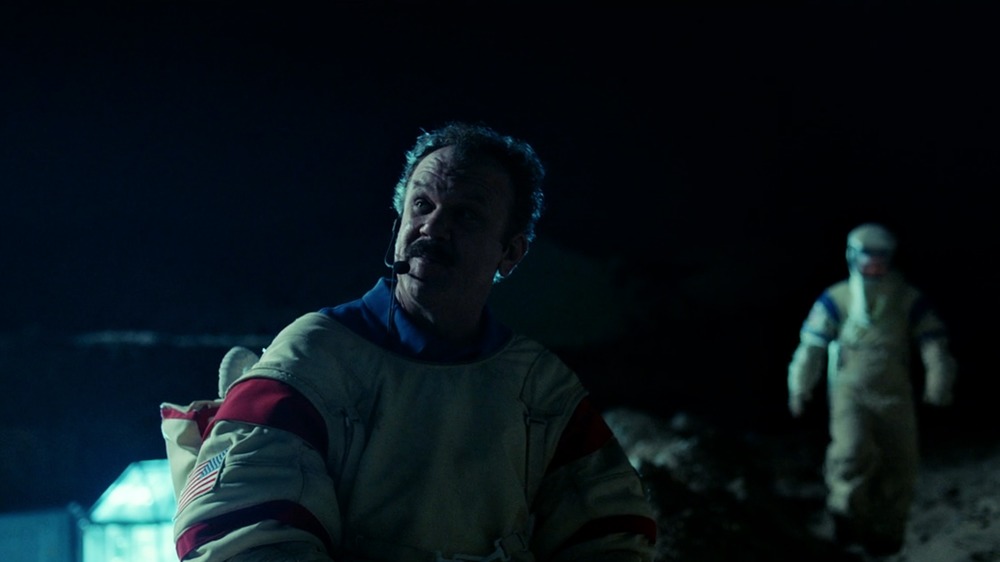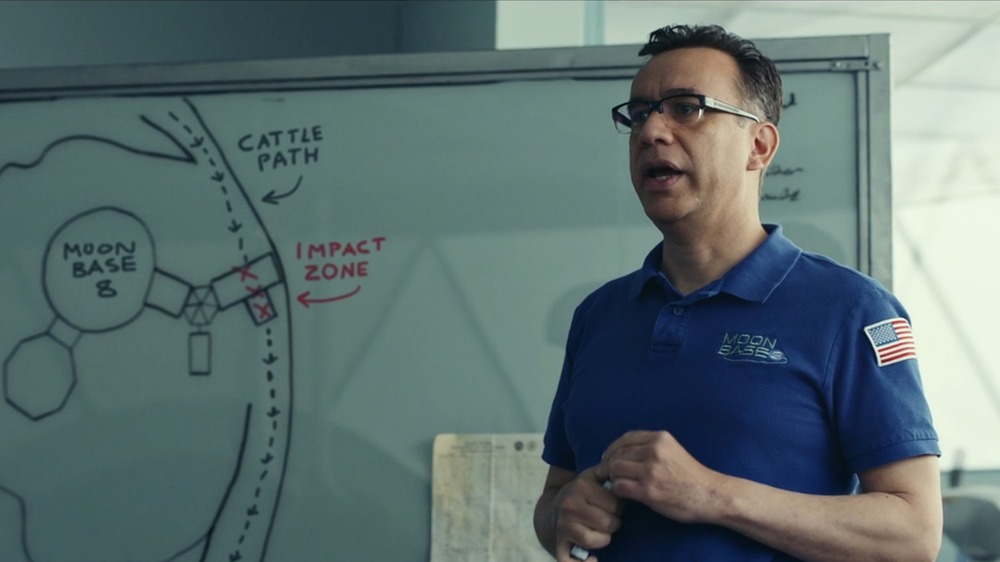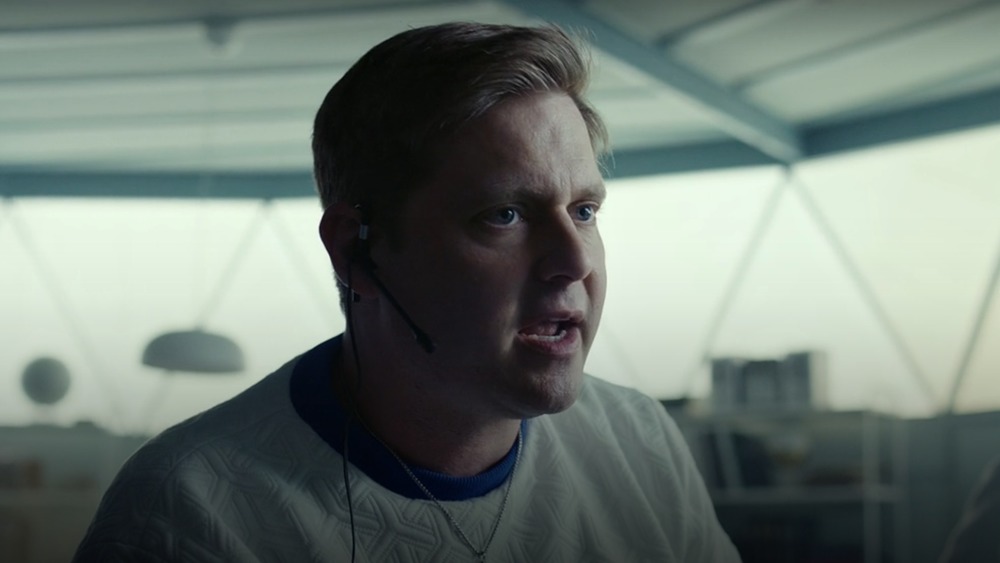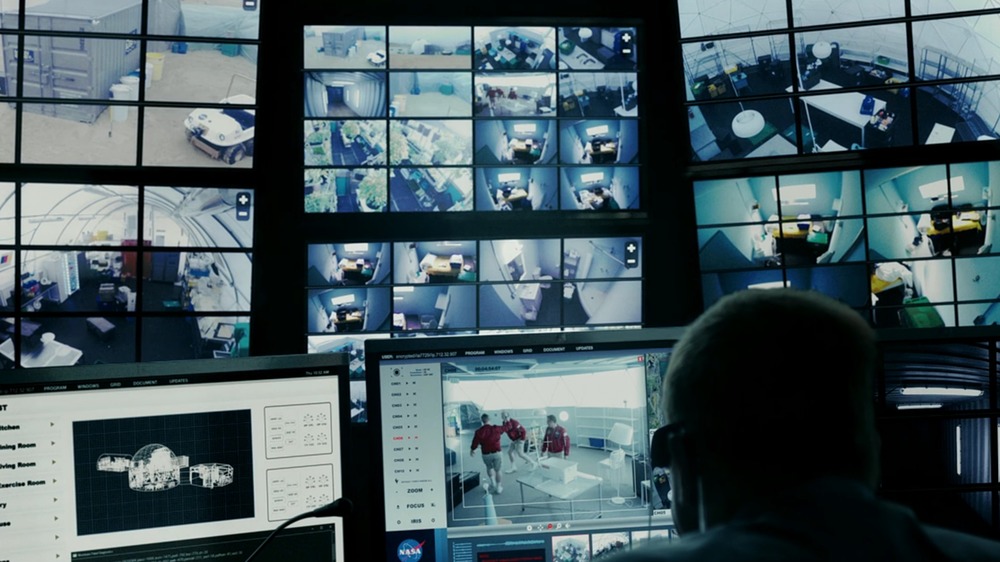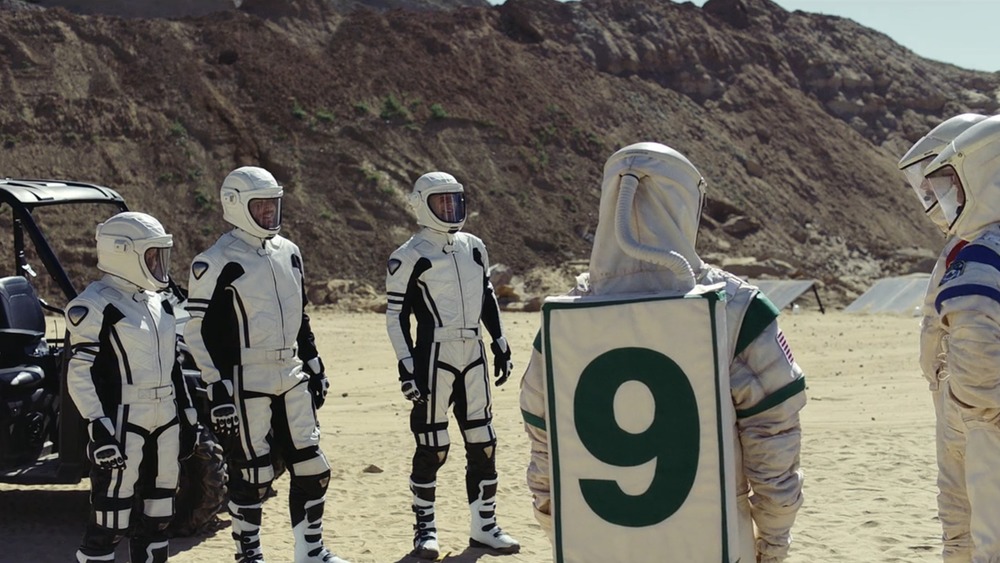The Ending Of Moonbase 8 Explained
When comedians Fred Armisen, Tim Heidecker, and John C. Reilly created their workplace comedy Moonbase 8, they didn't exactly realize how relatable it would become to people in 2020.
The series centers on three would-be astronauts living together in a mock moon base, secluded in the desert, with little contact from the outside world, hoping to leave their containment for something outside and tantalizing: the moon. However, just as we're all stuck in our houses, they're no closer to the moon by the end of the season.
Throughout Moonbase 8's six episodes, the incompetent trio of Cap (Reilly), Skip (Armisen), and Rook (Heidecker) utterly fail at looking anything like a space-worthy team. In the penultimate episode, Cap decides the team should move their base 100 yards to the side in order to rid themselves of the "negative energy" creating friction between him and Skip. While they ultimately bond over the experience, it turns out that their base now overlaps with the local cattle ranchers' land, who reveal that a herd of cows will thunder into it in the next couple of days. To solve the problem, Cap, Skip, and Rook set off a series of small rockets to divert the cattle around their base. As the climactic season finale, it's the first thing they've done that actually works.
However, when they ask NASA when they might go to the moon, NASA responds with no timeline. Instead, they're promoted to Stratus Class Red, the highest uniform classification. While the trio are delighted by their new red jackets, a clearly meaningless move on NASA's part, the camera pulls back to ominously reveal someone watching live video footage of them. Evidently, while Cap, Skip, and Rook thought they were on their own, NASA was keeping tabs on them all along.
Cap accepts that he may never achieve his dream
Robert "Cap" Caputo begins the season as a completely incompetent leader who manipulates his crewmates in an effort to keep their mission afloat. He's an ex-helicopter tour pilot, running from debt, and betting that going to the moon will solve all his problems. Despite all the evidence to the contrary, he has an unwavering belief in his ability to get to the moon. Even after coming face to face with the much better funded SpaceX crew living in a neighboring base, he calls them "dreamers" and insists that they won't ever get to Mars. The Moonbase 8 crew, however, will absolutely get to the moon, he says. His viewpoint seems to be thoroughly stuck in the 1960s.
But in the season finale, after being faced with the news that a herd of cows will be upon them shortly due to his own poor decision making, he sits outside and looks up at the moon. In this moment, he finally accepts that he won't be getting there. While Skip does eventually come up with a solution to keep the base safe from the cows, and Cap shows off his piloting skills when flying the drone crucial to the plan, he probably hasn't completely gone back on that acceptance. Maybe he won't get to the moon at all, but at least he can stay in this bubble, avoiding his debt and the outside world a little while longer.
Skip moves beyond his father's shadow and lets his intelligence shine
Dr. Michael "Skip" Henai's father was instrumental to the development of the Apollo program, and Skip never stops reminding his crewmates of that. In a room full of astronaut wannabes, he's the "Smart One" — something all of them really should be. But it's clear that as much as he thinks he's incredibly smart, he still has insecurities about living up to his father's legacy. However, at the same time, he feels NASA is wasting his intelligence. Throughout the season, he continually is on the edge of leaving his fellow crewmates for the likes of SpaceX, or revealing to NASA just how incompetent they really are. He sees them as weight holding him down.
However, in the second-to-last episode, Skip sees an error in his father's ways and realizes he doesn't want to be exactly like him.
The realization happens after Skip tests Cap's allegiance by tricking the man into pretend-killing him. He calls it the "Henai Test," and says that his father did it to him when he was just a teenager. However, when it causes friction between him and Cap, Skip realizes that maybe he shouldn't be just like his dad. It's only after letting go of his father's way of doing things that Skip manages to actually use his intellect to solve their problem: When it seems the base is going to be run down by cows and they're all going to lose their jobs, Skip is the one that comes up with a plan to save them. After several episodes of holding himself separate from the other two due to his higher intelligence, his wits prove to be what actually keeps them together.
Rook finally gets some respect
In contrast to Cap and Skip's unwavering desire to get to the moon, Professor Scott "Rook" Sloan has no such conviction. In the second episode, he's ready to leave the base, in part because he doesn't feel respected by the other two, and also because he's homesick for his family. As a devout Christian man wanting to spread his faith to the universe, he questions if he's truly on the right path, to the point of trying to cheat on his wife with his brief teammate Alisha (Diandra Lyle). However, as the bond between the three primary characters grows stronger, he seems to lose some of his doubt.
In the finale, Rook finally gets that respect from Cap and Skip that he'd been lacking. All throughout the climax of their rocket-fueled plan to divert the herd of cows, he's in charge of the music, but continually asks the others if it's okay to skip the song. Then, when it comes time for the final rocket launch, he asks Skip for the order to launch — but Skip leaves that choice up to him. Rook gets his moment to make a decision for the team.
Later, when they're left with one of the cows stranded in their greenhouse, the others applaud his choice to milk it. He is finally respected as part of the team.
However, earning the others' respect wasn't so much based on how he changed, but how they did. In the end, it was rather unclear what made his previous doubts vanish. His inappropriate sexual pursuit of Alisha seemingly came out of nowhere, although it may have been driven by a belief that his wife was cheating on him with their pastor. The series hinted at something happening there, but was never clear about it, and never showed a video call between them after that. Out of the three leads, Rook's character arc is the one that truly doesn't work.
The last scene suggests there's something more to the story
Ultimately, none of the characters get what they want by the end of the season, but they also don't face any lasting consequences for their actions. They are left almost exactly where they started. However, we're left with the knowledge that NASA has been watching their every dumb move and hasn't taken them off the mission. It leaves room for a second season, without requiring one — they have yet to announce if the show is cancelled or renewed.
The video monitoring isn't surprising, but it begs the question of what kind of experiment this trio is actually a part of. NASA might be watching them to understand interpersonal relationships in isolation, or perhaps they're acting as a kind of quality control: After all, these guys will mess anything up, so NASA can use that information to improve upon their real moon missions. While the audience certainly has to suspend some disbelief to accept that these buffoons even got this close to a moon mission, the last scene suggests there's more to the story.
While this season was shot with a fairly small budget — especially compared to, say, Tom Cruise's $200 million space movie — a second season would likely expand the setting, though probably not to space. Heidecker told Looper that he would like to delve into the past of the characters, through scenes set outside of their base. After all, he says, it's the emotion behind the characters that keeps them from being just a recreation of the Three Stooges.
Moonbase 8 pits old ideas against new
Throughout the six episodes of Moonbase 8, there's a constant clash of the old and the new. Cap, Skip, and Rook are continuously upstaged and threatened by younger, more competent people. Cap clings to his old-fashioned mindset that going to the moon will solve all of his problems, an idea reminiscent of the Space Race, but there's a complete disconnect: He's stuck in the past and yet he doesn't even remember that going to the moon was once considered absurd, and that it took actual innovation to get someone there. He calls the SpaceX team dreamers for thinking they can get to Mars, because he's an old guy whose ideas of what he can accomplish are limited by what's already been achieved.
It's easy to compare Cap, Skip, and Rook's situation to the current coronavirus pandemic — people stuck together and dreaming of going somewhere else — but it goes beyond that. In the real world, many folks are simply dreaming of going back to their favorite restaurants, while on the other hand, there's a whole section of people envisioning making huge changes to society. Moonbase 8 suggests that nostalgic thinking is only holding those individuals back, but in reality, it's holding everyone back. We're still trying to get back to the moon.
